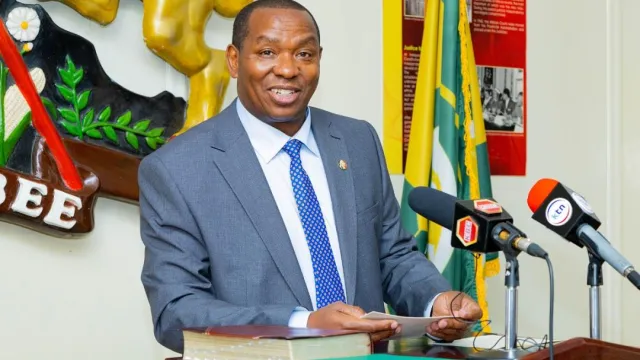Ndiritu Muriithi’s blueprint for transforming KRA

The Kenya Revenue Authority (KRA) Board chairman Ndiritu Muriithi.
Facing a volatile economic climate and mounting political challenges, Ndiritu Muriithi, the new Kenya Revenue Authority (KRA) Board Chairman, is setting out to redefine the role of the country’s tax collection agency.
In his inaugural statement upon taking the oath of office on Monday, the former Laikipia Governor outlined his blueprint, stating that he plans to anchor reforms on technology, professionalism, and service orientation, to help usher the KRA into new era of efficiency and trustworthiness.
"We will leverage technology to a greater extent, to ensure that our systems are fit for purpose, user-friendly, and easily accessible; in order to make it more convenient for all taxpayers to comply with their tax obligations," noted Muriithi, who was tapped recently from the opposition by President William Ruto under his broad-based government initiative.
According to Muriithi, an economist, his approach aims to not only streamline tax collection but also make compliance a straightforward and less intimidating process for individuals and businesses alike.
By integrating advanced digital tools, KRA hopes to combat tax evasion and broaden the tax base. These technological advancements will also enable real-time monitoring, improving transparency and accountability within the system.
Under Muriithi’s leadership, the KRA is set to embody the core values of being trustworthy, ethical, competent, helpful, innovative, and simple. "My vision is to steer KRA to become a more professional, fair, yet firm organization guided by these core values," he stated.
Previously, the tax authority has often been viewed with skepticism. Now, the new Board Chairman, who succeeds Anthony Mwaura, has his work cut out to rebuild public trust in the institution.
In July 2024, the High Court declared illegal the appointment of Anthony Mwaura as the KRA Board chairman at a time when he was facing charges of corruption and economic crimes. Judge Francis Gikonyo faulted President Ruto's appointment then, noting that the executive action "suffered procedural infirmity and illegality." Mwaura has since appealed the decision.
Reduce bureaucracy
By prioritizing integrity and simplicity, Muriithi said he seeks to reduce bureaucracy and improve taxpayer experience, fostering a stronger partnership between the KRA and the public.
Additionally, he promised to continue championing the extended tax amnesty program, which saw thousands of businesses and individuals benefit from the waiver of all penalties and interest for tax periods up to December 31, 2023.
"Among key initiatives that I’m keen to progress is the extended tax amnesty program," Muriithi explained. This move is expected to encourage more taxpayers to settle their dues without fear of punitive repercussions, thereby increasing revenue collection.
First rolled out in the fiscal year 2023/24, KRA's tax amnesty program resulted in the waiver of KES200 billion in penalties and led to the collection of KES50.5 billion in taxes. This program, however, closed on 30th June 2024.
"I want to encourage all taxpayers, whether individuals, businesses or corporates to take advantage of the amnesty at the earliest and enjoy the relief it brings with regards to taxation."
Muriithi’s vision also includes a paradigm shift for the KRA—from being perceived as an authority to becoming a service-oriented organization. "We shall continue with the journey to transition KRA from an Authority to a service-oriented organization; not just in name but in all administrative functions, processes, procedures, and conduct," he noted.
This transformation seeks to humanize the agency, making it more approachable and responsive to taxpayers' needs.





